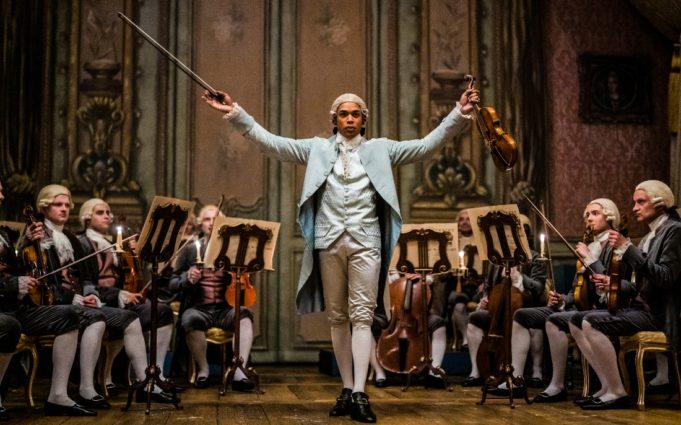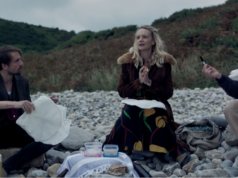I’m an editor on Genius.com, and in that capacity I learned about Joseph Bologne, the 18th-century man better known by his title of the Chevalier de Saint-Georges, and the possessor of an interesting life. Born to a French slave owner and his African slave on the island of Guadeloupe, young Joseph was educated in France as a boy and proved to be so gifted as a fencer that he was made part of King Louis XVI’s personal bodyguard at age 15.
However, we know him as a musician, Western history’s first Black composer as we understand that term. At age 24, he turned up in a royal orchestra for amateurs and professionals, and four years later he was made conductor of that ensemble. He played violin, and much of his music is for that instrument. Some of his performances were with Queen Marie Antoinette herself. (She fancied herself an opera singer. I’m surprised the movie doesn’t do anything with that.) The French called him “Black Mozart,” and if he wasn’t quite on Wolfgang’s level, well, neither was anybody else.
It would make for a good movie, and so it’s the plot of Chevalier. Some of the historical incidents here did indeed happen — the Chevalier did defeat the Rouen fencing master Alexandre Picard (Martin Matejcik) after the latter gave a speech about the inferiority of Black people. The Chevalier did lose out on the directorship of the Paris Opera because that institution’s star performers declared they wouldn’t take orders from a Black man. It’s not certain that he had an affair with a wealthy marquise who bore his child, but the Parisian gossip rags did report as much.
In other instances, the script (by Stefani Robinson from TV’s Fargo and Atlanta) fills in the blanks of Saint-Georges’ life. He didn’t humiliate a smarmy Mozart (Joseph Prowen) in the violin equivalent of a rap battle, although interestingly enough, he and Mozart did live in the same house for a couple of months in 1778. Nor did he face down the queen’s soldiers at gunpoint, though the concert-hall setting of that climactic scene makes an effective backdrop as rich, poor, Black, and white concertgoers rise up against the armed law-enforcement officials.
The movie does tell you that the Chevalier de Saint-Georges led an all-Black regiment during the French Revolution. It doesn’t tell you that he probably participated in that other revolution that turned the French colony of Saint-Domingue into the modern nation of Haiti. Oh, how I wish the movie had shown him meeting Toussaint Louverture, because if it happened, that must have been some kind of moment.
Instead, the movie concentrates on a period in the late 1780s, when the Chevalier (Kelvin Harrison Jr.) is comfortably ensconced as a court composer but lobbies Queen Marie Antoinette (Lucy Boynton) for the plum position at the Paris Opera. At the same time, his father’s death frees his mother (Ronkẹ Adékoluẹjo) from slavery to join him in Paris, and while he’s trying to acclimate her to France, he embarks on a hazardous affair with his new opera’s lead soprano Marie-Josephine de Montalembert (Samara Weaving), whose husband (Marton Csokas) is a brutish marquis who doesn’t want his wife on the stage and detests artists and anyone who raises their voice against the royals.
The Chevalier may be French, but we Americans have seen his like before, a Black man who thinks his sheer brilliance will make the white people who clamor for his music accept him as an equal. He carries himself like someone who knows he’s the best composer in Europe, and if that’s an act, we’re missing the sense that it is an act. Harrison does well by a moment late on reacting to the marquis’ horrible act of revenge against him, and he handles a sword with the deftness of a champion fencer. Still, this actor who has been so vivid in contemporary dramas like Luce and Waves seems caught between the character’s tragic and heroic aspects, and he comes off muted as a result. Perversely, the acting honors are stolen by the two white women around him — Boynton is authentically scary as the queen threatens the Chevalier before his big concert, and Weaving gives a great speech about how she knows how to act from her years spent convincing her husband that she’s a dutiful wife.
All this is laid out professionally and with some flair by Stephen Williams, a debut filmmaker who has enjoyed a long career directing American TV (Westworld, Lost). The soundtrack contains a great deal of the Chevalier de Saint-Georges’ music along with music by his contemporaries such as Glück to show us that his work stands the comparison quite well. Black history is full of stories such as the Chevalier’s that are known to too few people; I’ve been a classical music person since my teen years, and I only found out about the Chevalier recently. Bringing those stories to a wider audience is well worth pursuing, as this movie demonstrates.
Chevalier
Starring Kelvin Harrison Jr. and Samara Weaving. Directed by Stephen Williams. Written by Stefani Robinson. Rated PG-13.












